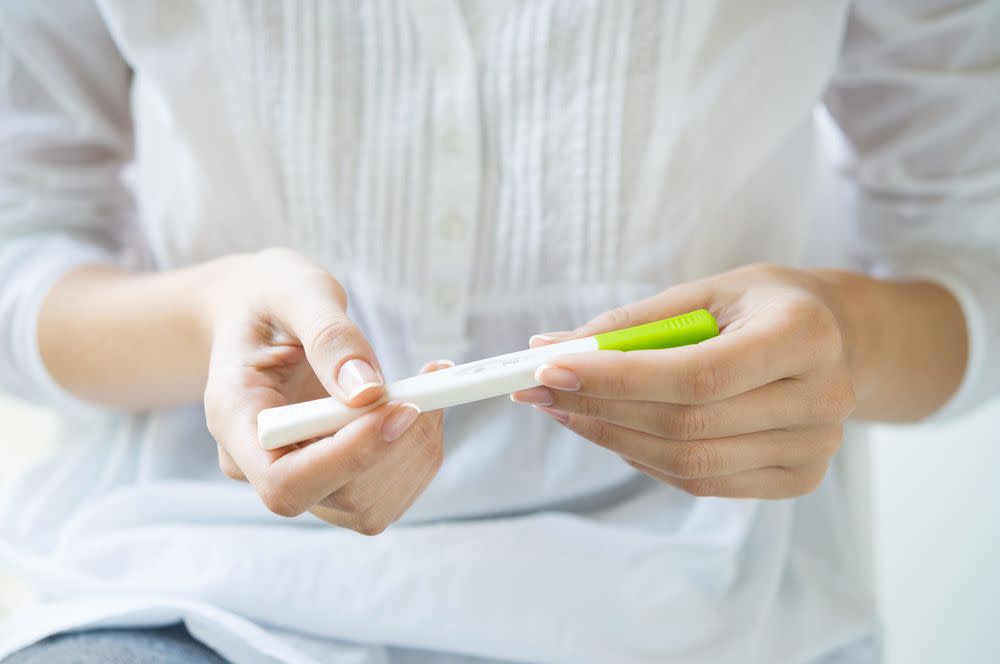Implantation Symptoms: Can You Experience Signs of Conception?

Women trying to conceive pay extra attention to their body, hoping to discover symptoms of implantation. “Implantation is when a fertilized egg implants itself into the lining of the uterus and starts to construct the placenta and embryo,” says Jingwen Hou, M.D., Ph.D., an Ob-Gyn specializing in reproductive endocrinology and infertility at Kaiser Permanente in Hawaii. Implantation usually occurs one-two weeks after ovulation, and it signals the beginning of a pregnancy.
Can women tell when implantation has occurred? The short answer is no. “We don’t usually talk about symptoms of implantation. Rather, we talk about early pregnancy symptoms,” says Dr. Hou. “There is no single symptom or symptoms indicating that implantation is about to or is happening.” That said, Dr. Hou explains that some women may experience minor bleeding or spotting, which may be related to implantation. Here’s what you need to know about the most common implantation symptoms, and what they tell you about conception.
RELATED: 14 (Very) Early Pregnancy Symptoms
Implantation Bleeding
“Some women may have a small amount of spotting or bleeding approximately 10 to 14 days after fertilization, and it’s presumed to be related to implantation,” says Dr. Hou. “We don’t have a good study showing how common it is, but based on different reports, implantation bleeding occurs with 10 to 30 percent of pregnancies.”
Implantation bleeding happens when the fertilized egg implants itself into the uterus, causing the uterine lining to shed from irritation. It usually lasts one to three days, and it occurs one week before your period or around the time of your normal period. Because of this, many women think they’re simply experiencing early or light menstruation. How can you tell the difference? Unlike red menstrual bleeding, implantation bleeding is usually light pink or brown. The flow should be light, and it doesn't get heavier like a normal period.
Implantation Cramps
Dr. Hou says women may also experience minor cramps around the time of implantation – “but we are not clear if that’s related to implantation,” she says. Cramping occurs around the same time as implantation bleeding and feels similar to menstrual cramps. They typically come and go in your lower abdomen or lower back.
RELATED: Am I Pregnant?
Other Implantation Signs and Symptoms
According to Dr. Chloe Acevedo, an Ob-Gyn at Atlantic Medical Group Women’s Health in Westfield, NJ, other implantation symptoms include nausea, sore boobs, darkening of the areolas, fatigue, headaches, bloating, mood swings, metallic taste, and changes in appetite – although these symptoms are more closely associated with early pregnancy. What’s more, “implantation symptoms can sometimes be confused with PMS symptoms, which can be vague and nonspecific,” says Dr. Acevedo. “It is important to understand that symptoms are not diagnostic and the only way to confirm if symptoms are due to implantation or PMS is with a pregnancy test.”
Sore Boobs: The pregnancy hormone hCG, estrogen, and progesterone may make your boobs very sensitive to the touch. This happens 1-2 weeks after conception, and it’ll feel more pronounced than normal PMS soreness.
Nausea: Since your digestive system slows down after conception, some women experience nausea, constipation, and indigestion (although full-fledged morning sickness is still a few weeks away). Progesterone and hCG hormones also contribute to these issues – and so does the heightened sense of smell that many pregnant women experience.
Darkening of the Areolas: Pregnancy hormones affect nipple cells (called melanocytes) and cause them to darken.
Fatigue: As your body prepares to grow a baby, you may feel more tired than normal. You can partly blame fatigue on the rise of progesterone and increased blood production.
Headaches: Are you experiencing tension headaches even though you aren’t prone to them? Increased blood volume and surging hormones may be the culprits.
RELATED: Stages of Pregnancy Week by Week
Bloating: Unfortunately for your skin-tight jeans, rising progesterone levels can bloat your stomach – similar to what you might experience during PMS.
Mood Swings: Just like some women get emotional before their period, they might feel extra moody after implantation due to pregnancy hormones.
Metallic Taste: Thanks to rising levels of estrogen, women may notice a bitterly metallic taste in their mouths following conception, says Dr. Acevedo.
Changes in Appetite: It’s not uncommon to have a shift in your taste preferences after getting pregnant, whether you’re suddenly adverse to coffee, your favorite dessert, or something else.
RELATED: When to Take a Pregnancy Test
What should you do if you experience implantation symptoms? “You can take a home pregnancy test,” says Dr. Hou. But since implantation happens 1-2 weeks after ovulation, it may be too early to get an accurate reading. It’s better to wait about a week after implantation when levels of the hCG will be high enough to detect.

